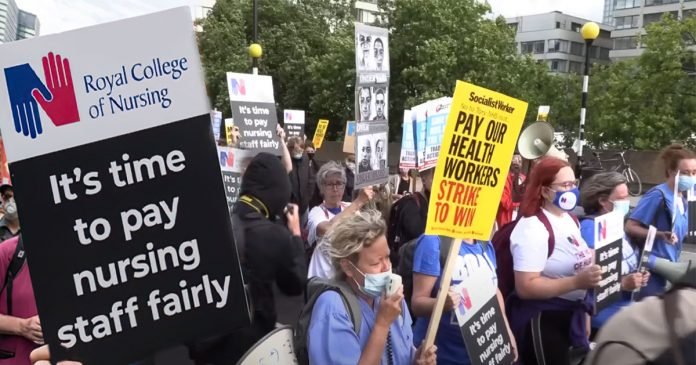Nurses in England have suspended next week’s 48-hour strike as they start talks with the government over pay.
A statement has been released by the UK government late Tuesday evening.
It states: “The Government and Royal College of Nursing have agreed to enter a process of intensive talks. Both sides are committed to finding a fair and reasonable settlement that recognises the vital role that nurses and nursing play in the National Health Service and the wider economic pressures facing the United Kingdom and the Prime Minister’s priority to halve inflation. The talks will focus on pay, terms and conditions, and productivity enhancing reforms.
“The Health Secretary will meet with the Royal College of Nursing on Wednesday (22 February) to begin talks. The Royal College of Nursing will pause strike action during these talks.”
The Royal College of Nursing and the Department of Health and Social Care issued a joint statement saying they would begin “intensive” negotiations.
Health Secretary Steve Barclay is due to meet union officials on Wednesday.
The RCN originally asked for a pay rise of 5% above inflation, but has since said it would be willing to meet the government half-way.
Next week’s walkout, from 1-3 March, was set to be the biggest strike of this winter’s pay dispute, with half of frontline services affected.
The action would have included nursing staff from emergency departments, intensive care units, cancer care and other services that were previously exempted.
RCN general secretary Pat Cullen said she was “very assured by the prime minister’s intervention”.
“We will put our plans on the table, they can put their plans on the table – but I’m confident that we will come out with a fair pay settlement for our nursing staff.”
She added “we will make sure that no stone is left unturned” and that a “fair pay deal is reached as quickly as possible so that we can bring a conclusion to these strikes”.
‘Sigh of relief’
Ministers had for months refused to discuss adding to the 2022-23 pay award of 4.75% on average for nurses and other staff.
The RCN for its part had made that a line in the sand – and it is fair to assume that the union head, Pat Cullen, would not have entered into the new talks if there had not been a softening of the government’s stance.
Shortly after the announcement that both sides would be restarting talks, the government also unveiled its plans for the 2023-24 pay rise, which would come in to effect in April.
It told the NHS pay review body it was willing to give a rise of 3.5%. But it does not rule out going higher than this.
Nobody is confirming the precise scope of Wednesday’s discussions but it seems likely that some sort of payment to add to the existing award this year will be on the table.
One source close to the negotiations said the door had been opened for next year’s pay award to be backdated.
The joint statement said: “The government and RCN have agreed to enter a process of intensive talks.
“Both sides are committed to finding a fair and reasonable settlement that recognises the vital role that nurses and nursing play in the NHS and the wider economic pressures facing the UK and the prime minister’s priority to halve inflation.
“The health secretary will meet with the RCN on Wednesday to begin talks. The RCN will pause strike action during these talks.”
Sir Julian Hartley, chief executive at NHS Providers, which represents health managers, said they would be “breathing a sigh of relief” at the news.
“The past weeks have seen a worrying escalation of industrial action, which has hit patients hard. This is the glimmer of hope we all needed.”
Other health unions though are frustrated at not being drawn into this process.
The NHS faces further industrial action from unions representing ambulance drivers to junior doctors and more dates could yet be announced.
The Scottish government has offered NHS staff – including nurses – a new pay offer for the coming year which includes a one-off payment and an average salary rise of 6.5% from April.
In Wales, nurses are currently being balloted over a new pay deal from the Welsh government and the RCN has put some planned walkouts for February on hold.
Support Independent Journalism Today
Our unwavering dedication is to provide you with unbiased news, diverse perspectives, and insightful opinions. We're on a mission to ensure that those in positions of power are held accountable for their actions, but we can't do it alone. Labour Heartlands is primarily funded by me, Paul Knaggs, and by the generous contributions of readers like you. Your donations keep us going and help us uphold the principles of independent journalism. Join us in our quest for truth, transparency, and accountability – donate today and be a part of our mission!
Like everyone else, we're facing challenges, and we need your help to stay online and continue providing crucial journalism. Every contribution, no matter how small, goes a long way in helping us thrive. By becoming one of our donors, you become a vital part of our mission to uncover the truth and uphold the values of democracy.
While we maintain our independence from political affiliations, we stand united against corruption, injustice, and the erosion of free speech, truth, and democracy. We believe in the power of accurate information in a democracy, and we consider facts non-negotiable.
Your support, no matter the amount, can make a significant impact. Together, we can make a difference and continue our journey toward a more informed and just society.
Thank you for supporting Labour Heartlands












